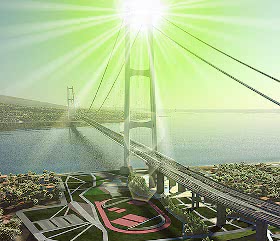
Federlogistica seems to have changed its mind on the bridge project
on the Strait of Messina which earlier this month obtained
the final go-ahead from the Interministerial Committee for the
economic planning and sustainable development. If in the last few years
two years the former president of the federation, Luigi Merlo, now
honorary president of Federlogistica, had repeatedly launched
the alarm for the impact that the height of the bridge, considered
insufficient, would have on the transit of ships in the Strait
 (
(
of
23
February 2023 and
3
May 2024), today this fear seems to be dormant despite the fact that
the designed height of the bridge is always the same. The current
president of Federlogistica, Davide Falteri, is convinced that
"look at the bridge over the Strait as an exceptional
infrastructural work, means having lost any vision to
the future and passively suffer the condemnation of our country to the
decadence. It is true: many
negative things, multiple hitches may occur, but
especially politics and business may not understand that the
bridge over the Strait of Messina is a unique opportunity".
 According to Falteri, the construction of the bridge is no less than
that "the unique opportunity to strengthen a country that is
has always been divided between North and South, progressively eliminating a
social injustices and allow Italy to exploit
full centrality in a Mediterranean that has returned to being
central and decisive, even a healthy and unhealthy connection with
other continents, Africa, a Middle East that is a candidate to be
a unique force on the world scene and a Europe that is too unbalanced
in the north, which also for this reason has failed its cohesion objectives
and growth".
According to Falteri, the construction of the bridge is no less than
that "the unique opportunity to strengthen a country that is
has always been divided between North and South, progressively eliminating a
social injustices and allow Italy to exploit
full centrality in a Mediterranean that has returned to being
central and decisive, even a healthy and unhealthy connection with
other continents, Africa, a Middle East that is a candidate to be
a unique force on the world scene and a Europe that is too unbalanced
in the north, which also for this reason has failed its cohesion objectives
and growth".
If before the bridge over the Strait was judged an obstacle to the
ship traffic is now even considered a work
thaumaturgical that can bridge social gaps and
unite, not only physically, the South to the North.
To tell the truth, Falteri does not attribute these portentous powers
to the bridge alone. According to the president of Federlogistica, the effect
prodigious could also be produced by an Economic Zone
Special of almost 5,580 hectares split into a western and
in an eastern one, with about 35% assigned to Sicily
and 65% to the east. SEZs that - he explained -
for Sicily it would mean a tax credit for investments in
capital goods with funds that could reach up to 50-100
million euros according to the project; administrative simplifications
and authorizations: simplified procedure with one-stop shops and times
reduced by up to a third; additional tax breaks, such as a
50% reduction in income tax for new settlements
in SEZs, for an initial period of seven years (extendable); Zone
Customs Clearance in some port areas (possible establishment) and
greater logistical and infrastructural integration (e.g. corridors
customs, freight terminals, railway hubs); Supported Programming
from PNRR funds, with investments for the "last mile" in the
ports and freight terminals.
"Once upon a time," Falteri said, "we used to talk about a 'granary'
of the world referring to countries such as Ukraine or North America. The
Sicily, and it is just one example of its potential -
underlined - can become the logistics hub
Mediterranean and European fruit and vegetables, as well as
related food and canning industries. But it is in
condition, due to its geographical position, that it is also the hub
of new energy resources, including hydrogen. And without
forget the potential (including cultural and historical) to
take on within the framework of a large interconnected Free Zone, a
start-up region for technological innovation".
Falteri seems even more convinced than the minister
Matteo Salvini of the unexpressed potential that the bridge
on the Strait could unblock: "today - said the
president of Federlogistica - it's time to say enough:
with a world conditioned by trade wars, tariffs and counter-tariffs,
The bridge has all the characteristics to become the artery of a
economic and social body hitherto underdeveloped often
precisely because of political short-sightedness. And logistics, twinned with the
Free Zone, can and must be the added value, activating
with the bridge a chain reaction of infrastructures also
that can be financed by private individuals, of industrial settlements that are not slaves to
public aid and a network of connections intended to enhance the
the potential of a land that for too many years (as a great
part of the South) was considered as a
A lost battle."